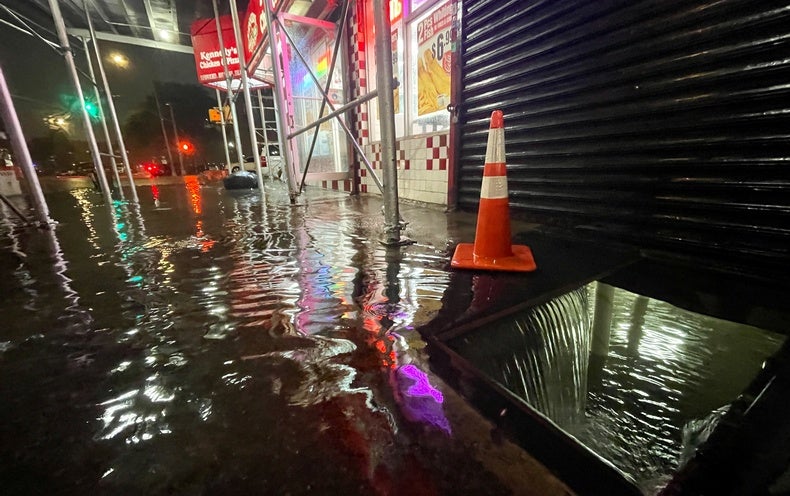CLIMATEWIRE | It was the most intense rainfall in New York City history and caused the deaths of 11 people trapped in flooded basements.
Nearly two years after Hurricane Ida shocked New Yorkers, officials are warning that residents of New York — and many other U.S. cities — face growing danger as climate change intensifies urban flash flooding.
A series of new reports by the Federal Emergency Management Agency says that most urban drainage systems “were not built to handle the amount of runoff from increasingly intense storms.”
In addition, most cities with urban flooding “do not regulate” development in the vulnerable areas, FEMA said, drawing a contrast with development restrictions in areas vulnerable to coastal or river flooding.
The result could be a replay of the catastrophe that Ida caused in New York City, where a day of record-setting rainfall overwhelmed the drainage system. Water poured into city streets and inundated some of the city’s illegal and notoriously unsafe basement apartments.
New York City Comptroller Brad Lander has warned that 43,000 basement apartments “are currently facing some type of flood risk.” As climate change intensifies storms, the number will grow over the next 30 years to 136,000 basement apartments, a report by Lander said.
The apartments are largely in New York’s outer boroughs. Many occupants are immigrants or minorities who need low-cost housing.
“Ida will not be the last flash flood that puts the lives and homes of basement-dwellers at risk,” Lander wrote in an August report.
Although New York City faces unique risks with its surfeit of unsafe basement apartments, the FEMA reports make clear that the danger is ubiquitous as climate change threatens to overwhelm so many urban drainage systems.
Heavy rainfall is exposing the limits of drainage systems that were built decades ago and are often poorly maintained and easily blocked by street debris.
“Many cities” have drainage systems that are designed to handle only routine storms — “five-year” storms likely to happen every five years — and are overloaded by the rarer storms that are becoming more frequent, FEMA says.
“As storms get more intense and rainfall amounts increase due to climate change, there will be more runoff water than some systems can convey,” FEMA wrote in a series of reports released in June by a team that analyzed the risk of flash flooding in New York City and nationwide. The FEMA team began its analysis shortly after Hurricane Ida hit New York in early September 2021.
Increasing the capacity of drainage systems is expensive and “may take decades,” FEMA’s reports say. They urge a range of improvements such as building rain gardens on roofs and sidewalks and installing street surfaces that are porous.
Ida broke New York City records for both total rainfall and rainfall intensity. After making landfall in Louisiana as a Category 4 storm, Ida’s winds weakened as it traveled northeast while its rainfall remained heavy.
In New Jersey, 30 people were killed as Ida’s rainfall overwhelmed drainage systems across the state. In New York City, Ida dumped 7.13 inches of rain in total, including one period when 3.15 inches fell in an hour.
The drainage system in much of New York City, including parts of Queens where most deaths occurred, are built to handle only 1.5 inches of rain per hour, FEMA found.
Ida hit New York 10 days after Hurricane Henri, a Category 1 storm, had broken New York’s previous rainfall-intensity record by dropping 1.94 inches in an hour. Henri’s rainfall left the city’s parks and greenery saturated and unable to absorb rain from Ida.
FEMA’s new reports urge New York City to require or encourage the installation of water sensors in basement apartments that warn residents and emergency response personnel when water levels become dangerous. The city should expand its inspection routine for illegal apartments to include flood vulnerability and help building owners understand how they can mitigate flood risk for basement units.
The FEMA reports also note that the agency’s own maps of areas at risk of flooding do “not indicate your risk from urban flooding.” The maps show areas at risk of flooding from coastal storms and river overflows.
New York City has made several changes since Ida and is planning upgrades to its drainage system. The city launched a network of street-level flood sensors that alert residents, agencies and emergency responders. A total of 58 sensors have been installed with plans for 500 sensors by 2027.
The city also established new rules that require newly developed or redeveloped lots to include green infrastructure such as rain gardens or rain storage to reduce the amount of water flowing into streets and the city drainage system.
Reprinted from E&E News with permission from POLITICO, LLC. Copyright 2023. E&E News provides essential news for energy and environment professionals.

